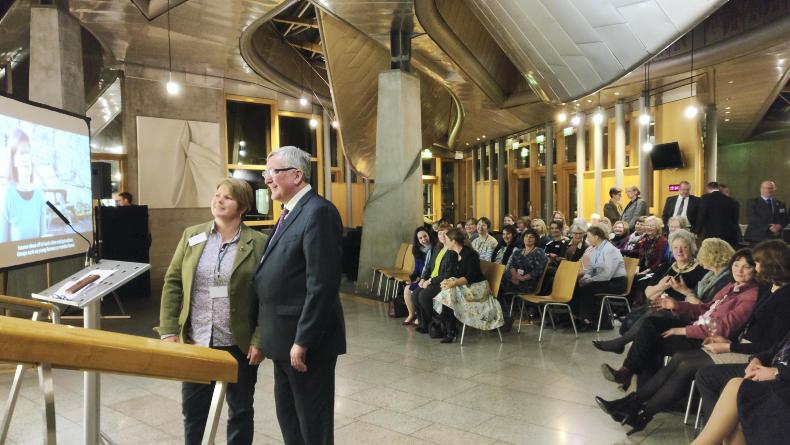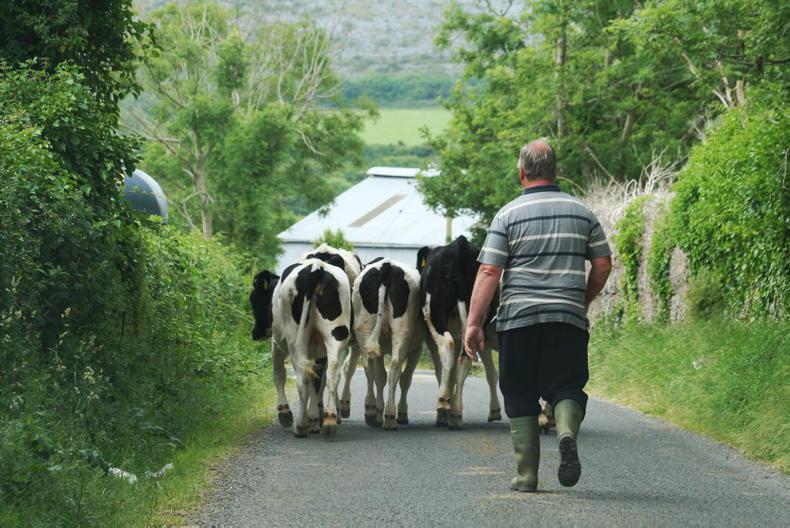The tradition of handing farms down to sons, rather than daughters, has created an ‘inheritance barrier’ for women interested in agriculture, according to research commissioned by the Scottish Government.
“Inheriting is key to establishing a successful farming business,” said Lee-Ann Sutherland, agricultural advisor with Scotland’s Rural College (SRUC). “It is possible to do it without it, there are lots of people out there aiming in that direction but it is so much easier when you inherit a farm. That is the most common way of getting into the agricultural sector.”
Lee-Ann was speaking at a reception hosted by the Scottish Government’s Women in Agriculture Taskforce at Holyrood Parliament on Wednesday 10 January. Co-sponsored by MSPs Emma Harper and Gail Ross, the event heard from chair of the Women in Ag taskforce Joyce Campbell, Rural Economy Secretary Fergus Ewing and the researchers behind the ‘Women in Farming and the Agricultural Sector’ report published last year.
“In Scotland it has been the case for as long as we think back that the farm is passed to the son. It is a cultural practice, not a legal one,” Lee-Ann said.
“There is no legal requirement for that to happen, it just does because it is embedded in farming culture. While women do inherit farms, it is not that common.”
The report found that male inheritance of farms is a socialised practise from childhood. This means that women are socially aware that they are not going to inherit the farm they grew up on.
“There are women out there with the same sort of experience on farm as their brothers or cousins, but it’s understood from an early age that they will not be the successor.
“So when it comes to choosing a career they think about other options. If they are interested in agriculture they think: ‘Ok, maybe I’ll be an agricultural advisor’ so they are still making a contribution to the agricultural sector.”
What is also clear, given the high level of response to surveys carried out for the report, is that the likelihood of a woman becoming interested in the leadership of a farming organisation is directly co-related to whether or not she inherited agricultural land.
“So how do you change something that is so culturally embedded? You can’t legislate changes for something like that, but you can raise a lot of awareness.
“Succession is a big issue that does not get talked about enough anyway, but by talking about succession more actively earlier on and encouraging parents to think of all their children equally that’s how we make a step toward making a change. The other thing we can do is put more emphasis on new entrants in general.
“Research has shown that men and women tend to come into farming as partners rather than with a gender divide.”
However there are some legal barriers, particularly in the case of crofting law. Crofting tenancies are associated with a single person and that’s typically the male in the household.
This becomes a particular issue in the case of divorce, for instance, where a woman who has been actively involved in the croft may not have access to the croft house or land as a result of the divorce.
Economic development on farms
The survey also looked at the role that women play in the economic development of farms. It found that women are involved in the entire range of activities that happen on farms.
“These are highly skilled, highly competent women,” said Lee-Ann. “They are particularly interested in developing their farms economically, we see that in their interest in diversification.
“What’s interesting in the women who undertake diversification on farms is that they do it on quite a wide range of scales. Some of them do start new growing farm businesses, while some will look at having another job they can do on the farm.”
1. Women are an underutilised resource – there is a lot more that women can be doing in farm organisations that we think would make them run better and make better decisions
2. Agriculture in Scotland is going to be making a lot of changes and adjustments in the next few years and you don’t want to be leaving half your team on the bench.
3. There is a tremendous opportunity for training to support women going forward.
Thoughts from the audience
Clare Sturla, SAYFC: “This was a really positive event with great attendance. It was good that you had the Women in Ag conference in the RBS in November and that group was in attendance here tonight. It is recognition from the government that there is a need for this taskforce. There have been previous events but this makes a real statement. Agricultural groups run by women have been doing the groundwork and this takes it to the next level. There’s evidence there to show there is a need for women to have extra support and recognition.”
Pamela Nicol, Blackie Association: “The taskforce needs to be careful that it doesn’t alienate women. Having a women-only organisation upsets some men. It can be dangerous that, if it goes too far, it can segregate the sector more than it means to. It should be coming together rather than pushing it apart. I think the younger generation of men want to include women and they see the value of that.
“I think women are well-represented in the sheep sector. I’m chairman of the Blackie Association and I know that the NSA has a good proportion of female office bearers, in fact I think the chairman is outnumbered by women.”









SHARING OPTIONS